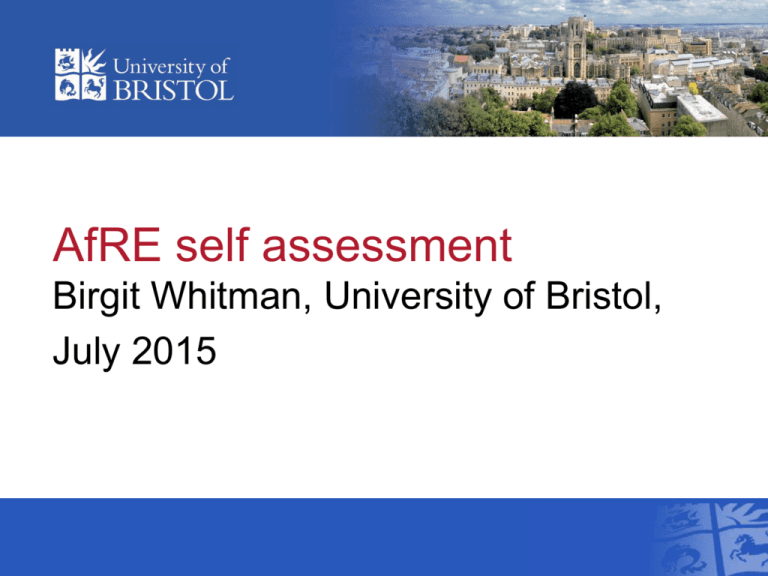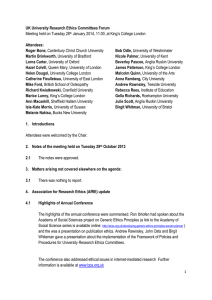AfRE framework slides - Association for Research Ethics
advertisement

AfRE self assessment Birgit Whitman, University of Bristol, July 2015 Self-assessment: Ethics standards 1=not met, 2= partially met, 3=almost met, 4=fully met / exceeded UKRIO / AfRE 1: Principles of Research Ethics 1. Autonomy 2. Beneficence 3. Non-malfeasance 4.Confidentiality 5. Integrity Evidence Action Self-assessment: Ethics standards 1=not met, 2= partially met, 3=almost met, 4=fully met / exceeded UKRIO / AfRE 2: Principles of governance arrangements Independence a. Do reviewing committees include members from a wide range of disciplines? b. Do committees have members from outside the Faculty or academic unit covered by the committee? c. Do the constitutions of RECs grant freedom to make ethical judgments, while being consistent with accountability? d. Do committees include ‘lay’ or external members e. (if faculty/ departmental committees in place) Is there an over-arching strategic committee that functions as the appeals committee f. Are arrangements for appeal in place? Evidence Action Self-assessment: Ethics standards 1=not met, 2= partially met, 3=almost met, 4=fully met / exceeded UKRIO / AfRE 2: Principles of governance arrangements Competence a. Does the UREC have a clear process in place to ensure that ethical opinions are reached timely and consistently? b. Does the UREC have a standard form that asks all the questions that a competent REC in that Faculty of Academic Unit needs to have answers for? c. Does the university demonstrate that it has a commitment to competent ethical review by recognising UREC members for their contribution to the University by citizenship recognition or allocated hours in the working week? Evidence Action Self-assessment: Ethics standards 1=not met, 2= partially met, 3=almost met, 4=fully met / exceeded UKRIO / AfRE Domain 2: Principles of governance arrangements Facilitation: The Ethics review infrastructure must be clear a. How is the independence and integrity of committee decisions maintained? b. What is the mechanism for appeal? c. What procedure deals with complaints that an applicant had been treated unfairly or discourteously. d. How are RECs linked to the Research Governance structures? e. How is compliance with ethical requirements monitored? How is non-compliance addressed? f. Job descriptions or TOR for Research Ethics Evidence Action Self-assessment: Ethics standards 1=not met, 2= partially met, 3=almost met, 4=fully met / exceeded UKRIO / AfRE 2: Principles of governance arrangements Openness, Transparency and Accountability a. How are the ethics policies and processes of review made available to the public? b. How is individual intellectual property safeguarded? c. Is the policy and process regularly reviewed? d. How is confidentiality about any disputes or appeals maintained? Evidence Action Self-assessment: Ethics standards 1=not met, 2= partially met, 3=almost met, 4=fully met / exceeded UKRIO / AfRE 3: Policies, Procedures and Guidelines / SOPs Policy Does the institution have a robust ethics policy Standard Operating Procedure The institution has a framework to meet compliance obligations. The SOP or guidance framework should cover the following: a. The role of a Research Ethics Committee b. The constitution of a Research Ethics Committee c. Applications d. Fast tracking Ethical Review e. Devolved Review Evidence Action Self-assessment: Ethics standards 1=not met, 2= partially met, 3=almost met, 4=fully met / exceeded UKRIO / AfRE 4: Training and development Training provision What arrangements are in place for a. Training of ethics committee members b. Training of other academic staff in the institution Evidence Action






